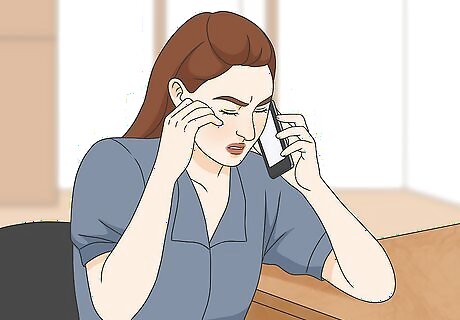
views
- You might feel turned off by your husband because you feel emotionally distant from one another. Taking time to rebuild your bond may help you feel more attracted.
- Stress and low confidence may make it hard to feel aroused. Mitigating stress and boosting your confidence may help you feel more “in the mood.”
- If you feel like your relationship has lost its romance, try to have regular date nights or spice things up in the bedroom by exploring your sexual fantasies.
Reasons You May Feel Turned Off by Your Husband

You feel emotionally disconnected. You’ve likely seen a good-looking stranger and felt a pull of attraction based on looks alone, but in a long-term relationship, your sexual desire for your spouse is usually based on appearances as well as emotional intimacy. If you and your partner have drifted apart emotionally, it’s very possible you’d experience a dip in your sexual desire.

Their physical appearance has changed. The longer you’re together, the more likely it is that you and your spouse will start to look a little—or a lot—different from how you looked when you first met. Weight gained or lost, gray hair (or no hair)—there are a lot of ways in which time and circumstance affects our bodies. You may not be as physically attracted to your husband as you used to be, and this could affect your desire for him. It’s also possible that if your own body has changed, you may feel less confident—and therefore less “in the mood.”

They don’t put in enough romantic effort. Maybe your courtship was characterized by candlelit dates, thoughtful presents, or just regular quality time, and nowadays, the romance has faded. You don’t feel very special, and you and your spouse don’t spend much time together beyond discussing the kids or bills or other practical and decidedly unromantic matters. This is common among couples who’ve been together for a long time, especially if they have other responsibilities, but it can really get in the way of your sexual relationship.

You’re dealing with unresolved conflicts. If you and your husband have been bickering a lot lately or struggling to resolve ongoing issues, probably the last thing you want to do is jump into bed with him. All couples deal with conflict, but if all your time together is spent dealing with your disagreements, it makes sense that you’d feel less attracted to him.

Your sexual routine has grown stale. Maybe what was once exciting and new in bed has become commonplace—or there are fantasies you’ve been wanting to try and don’t know how to bring them up. Most couples experience stagnation in their sex life when they’ve been together for a while, but if you don’t address it and find a way to spice things up again, it could leave you feeling turned off.

He's put less effort into his hygiene. In the early days of your relationship, couples are more likely to spend time scrubbing down and dolling up to make a good impression before a date. As time passes and you grow more comfortable with one another—not to mention distracted by other responsibilities—being neat and tidy for your spouse may become less and less of a priority. If your husband jumps into bed right after working out, neglects to trim his facial hair, or what have you, you may feel a little turned off, and possibly repulsed.

One or both of you are struggling with stress. The older you get, the more responsibilities are likely to fall into your laps: household duties, aging parents, your own health, children if you have them, work, and many other responsibilities. Feeling stressed out by the demands of life is almost certain to make you less “in the mood.” You and/or your husband may feel like these responsibilities take priority over your sex life, but your physical dynamic is an important and foundational aspect of your overall relationship, and therefore needs regular attention.

You don’t have enough in common. Maybe you bonded over shared interests and viewpoints at the start of your relationship, but as time has worn on, you’ve both developed interests in other things, and maybe even shifted your outlooks on life. Feeling like you don’t have enough in common or don’t see the world similarly enough can make you feel more distant and less attracted to one another.

He’s broken your trust. If you’ve experienced betrayal by your husband, such as sexual, emotional, or financial infidelity, you may find it hard to feel close to him again for a while. Even if the situation was resolved and you decided to move past it, desire, unfortunately, doesn’t always work according to the brain’s timeline: your head may tell you you’re beyond what happened, but that doesn’t mean your heart is. Not trusting your husband is likely to leave you feeling turned off and even angry or repulsed.

Poor health makes it difficult to be intimate. If your husband is dealing with declining mental or physical health, he may feel less energetic, less confident, or less able to perform sexually, which may leave you feeling less interested in sex yourself. On the other hand, if you’re dealing with health problems yourself, you may experience a lower libido or lack of interest in physical intimacy, inability to perform, or lower confidence levels.
How to Stop Being Turned Off by Your Husband

Share how you’re feeling with him. While it may be hard to talk about, sharing your feelings with your husband can help you both work through the problem together. Find a time when you’re both calm and aren’t about to do anything else (like go to work or on vacation), and approach the subject gently and in an open-ended way: “Hey Mark, I feel like we aren’t connecting in the same way as we used to. Can we talk about it?” “Jerrold, do you think we could talk about our sex life? I don’t know if you’ve felt this way, but I’ve been having trouble lately getting in the right mood. Maybe we could come up with a solution together?” Because sex and desire can be sensitive topics for many couples, try to use “I” language to avoid coming off accusatory.

Manage your stress. If stress is negatively affecting your sex life, finding ways to mitigate that stress may help you feel more calm, confident, and in control—all of which can help you have a thriving sex life. Eliminate any sources of stress that you can; for the ones you can’t, try to take steps to feel less overwhelmed: Ironically, having sex has been shown to decrease stress and anxiety. Take time to breathe during stressful situations. The 478 breathing technique, for instance, can help calm you down and lower your heart rate: just breathe in through your nose for 4 seconds, hold for 7, and exhale through your mouth for 8 seconds. Taking care of your body can help you feel less stressed—even if it feels like just one more thing added onto your already busy schedule. Take time to exercise, eat well, and get caught up on your doctors’ appointments. Consider going to individual therapy to discuss your stressors, or talk through your stress with your husband or a trusted friend. Your husband may be dealing with the same stress as you, and talking through it could help you both feel validated.

Rebuild your emotional connection. Because emotional intimacy is so linked to sexual desire, feeling emotionally closer to your husband could help you feel more attracted to him. Spend quality time together and get to know each other—even if you feel like you already know everything about one another, there’s always more to learn. Dedicate time to weekly dates. These don’t have to be big, expensive productions—your “dates” could be as simple as taking 2 hours to yourselves after the kids have gone to bed, or walking in the park on your lunch breaks. Even tiny meaning-making rituals can help you feel a lot closer to each other. For example: Start a ritual of waking up a half-hour earlier so you can have coffee in bed together. Make a habit of asking one another how your days were every evening—or ask a more specific question, like, “What was one thing that made you smile today?” Make an effort to acknowledge one another’s strengths regularly. If you both feel seen and appreciated, you’re likely to feel more confident and closer together. Trying new things together, like traveling, taking a class, or trying a new restaurant, can make things feel fresh and new even after being together for many years.

Try new things in bed. The answer to your problem may be as simple as spicing things up in the bedroom. Just because it’s “simple,” though, doesn’t mean it’s necessarily easy: talking about sex and desire is hard for many people, even when it’s with someone they know very well, like their spouse. However, discussing your needs in the bedroom and maybe trying some new things may help you both feel more excited to be together—and it may strengthen your bond as well. Set aside time to talk to your husband about your sex life. It could even be a fun date night activity: break out the wine and chocolates and talk about your most secret fantasies together. Even just talking about your fantasies may turn you both on.

Try not to overthink things in the bedroom. It’s easy to fall into the trap of putting too much pressure on yourselves to have an amazing sex life—which, paradoxically, can make it not-so-amazing. When you do have sex, try not to overthink it or worry too much about the “performance” of sex—instead, try to appreciate your time together and enjoy the physical intimacy, whether it comes with an orgasm or not. This doesn’t mean sexual pleasure isn’t important, but focusing only on the end goal of sex can make your sex life feel like a duty or a performance rather than quality time spent with someone you love.

Establish healthy boundaries. It’s common to feel a lack of desire if you don’t have enough time to yourself. In particular, mothers of small children may feel “touched out” by the end of the day and not want to engage in sex with their spouse. Establishing a practice of getting plenty of alone time before being physically intimate with your husband may help you feel more “in the mood” and attracted to him. Be sure to communicate your boundaries clearly to your husband. It’s possible he doesn’t realize when you need space, but a calm but firm explanation can help him understand your needs: “I don’t really feel like being touched right now because I’ve been with the kids all day, Akbar, but maybe later tonight, after I’ve showered and had some alone time.” “Hey Dave, I just got home from work and I’m still in ‘work’ mode, so I’m not really in the mood. I just need an hour or two to decompress.” Setting boundaries also means giving yourself time and patience to work through your low desire, and not forcing yourself to be intimate if you don’t want to.

Get professional help. Almost every couple goes through lulls in their sex life, but if you’re struggling to work through your problem, it may be worth seeing a couples counselor. Even if you and your husband are both committed to figuring out a solution, it’s sometimes helpful to have the support of an objective third party. A licensed therapist can help you work through why you might be struggling to feel desire and how you might go about resolving the problem. To find a couples counselor, consider asking friends who have gone to therapy for recommendations or check out Psychology Today’s Find a Therapist page to locate marriage counselors in your area.

Consider if the relationship is worth staying in. While there are steps you can take to improve your sexual relationship with your husband, you’ll likely need your husband’s support to make it work. If your husband doesn’t seem willing to find a solution, or if you both try and things aren’t improving, it may be worth considering if the relationship has an expiration date. Know that many couples experience waning attraction and find ways to work through it, but it’s also valid to end your relationship if your partner is unwilling to meet your needs or if you’re not compatible. It may also be worth considering if an open relationship would work for you and your husband.
Can a marriage survive without desire?

Yes, but “surviving” doesn’t necessarily mean “thriving.” For some couples, sex doesn't need to be a significant part of their relationship, but for many people, sex and desire are important aspects of their bond with their spouse. It’s not impossible for your relationship to survive without desire, but if you and your spouse don’t make an effort to bridge the gap between you, your bond is likely to weaken. It’s almost inevitable that your physical relationship with your spouse will change as the years go by, but adapting to those changes doesn’t mean neglecting your emotional or sexual needs.
Final Thoughts

Waning desire is common, and it’s often fixable. It’s not abnormal for couples to go through ruts in their sex life. It can be lonely and frustrating, and you may wonder if it spells the end of your relationship. In certain cases, it may—and know that it’s OK to end a relationship if you feel your needs aren’t being met or believe you and your spouse just can’t bridge the gap that’s formed between you. But it may be worth speaking to a couples counselor about the issue, as the problem is often fixable with time, patience, and love.




















Comments
0 comment